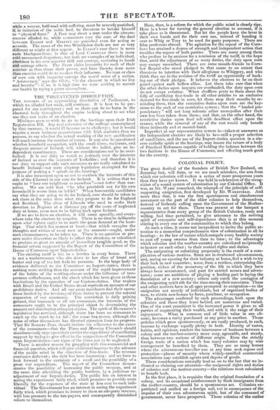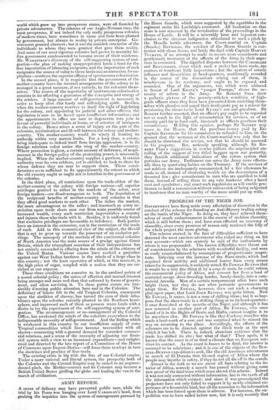COLONIAL POLICY.
THE great festival of the founders of British New Zealand, on Saturday last, will form, or we are much mistaken, the tent from which our colonists will reckon a series of more prosperous years than they have yet known. It was held in celebration of the recog- nition of a sound system of colonization by our Colonial Office. It was, as Mr. WARD remarked, the triumph of the principle of self- supporting emigration, first developed by Mr. WAKEFIELD. And more than that, it was the first spontaneous and simultaneous movement on the part of the older colonies to help themselves, instead of listlessly calling upon the Government of the Mother- country to act for them. There was present at the banquet a representative from every group of the British Colonies, ready and willing, had time permitted, to give utterance to the reviving spirit of enterprise and self-dependence that is at this moment stirring in every one of the communities to which they belong.
At such a time, it seems not inexpedient to invite the public at- tention to a somewhat comprehensive view of colonization in all its bearings : to the law of nature which compels every healthy society to cast off young swarms from time to time; to the advantages which colonies and the mother-country are calculated reciprocally to bestow on each other ; to their mutual rights and duties. The emigrating or colonizing propensity is the result of a com- plication of various motives. Some are in straitened circumstances, and, seeing no opening for their industry at home, feel a wish to try their luck in new countries ; some, from a restless, enterprising dis- position, sicken of the monotony of the life to which they have always been accustomed, and pant for untried scenes and adven- tures; some are ambitious of playing a leading part in laying the foundation of a new society; others only catch the contagion of the emigrating spirit rife for the time among their associates. These and other motives have in all ages prompted to emigration—to the emigration not merely of individuals, but of organized bodies of men, to obtain new homes by force, purchase, or occupation.
The advantages conferred by such proceedings, both upon the colonists and those they leave behind, are numerous and varied. One of the most prominent is the increased power it gives to all parties of augmenting their wealth, and with it the range of their enjoyments. What is common and of little value in one cli- mate, becomes a rarity purchased at any price in another. Those articles which grow spontaneously, or are easily produced, in each, become by exchange equally plenty in both. Identity of tastes, habits, and opinions, renders the intercourse of business between a colony and the mother-country more easy, agreeable, and steady, than between two nations of different origin. Even the strictly foreign trade of a nation which has many colonies may by wise management be benefited by them. They are so many homes where the adventurous traveller can at any time seek repose and protection—places of security where widely-ramified commercial associations may establish agents and depots of goods.
These considerations naturally lead us on to the last that we in- dicated as claiming our attention—the reciprocal rights and duties of colonies and the mother-country—the relations most calculated to benefit both.
In the first place, it is requisite that the original foundation of a colony, and its occasional reinforcement by fresh immigrants from the mother-country, should be a spontaneous act. Colonists ex- patriated and settled on a foreign soil, not in consequence of the Impulse of their own adventurous spirit, but of the command of government, never have prospered. Those colonies of the earlier world which grew up into prosperous states, were all founded by private adventurers. The colonies of our Anglo-Norman race, the most prosperous, if not indeed the only really prosperous colonies of modern times, have sometimes in name and form been planted by government, but always in reality by private enterprise. Go- vernment granted charters ; but it was the unaided enterprise of the individuals to whom they were granted that gave them reality. And some of our most vigorous colonies had grown to maturity be- fore government condescended to become aware of their existence. Mr. WAKEFIELD'S discovery of the self-supporting system of emi- gration—the plan of making unappropriated lands a fund for the free importation of labouring emigrants, and the importation of such emigrants the source of value to those lands and an attraction for ca- pitalists—confirms the superior efficacy of spontaneous colonization.
In the second place, it is requisite that the government of the mother-country leave the internal arrangements of the colony to be managed in a great measure, if not entirely, by the colonists them- selves. The source of the superiority of spontaneous colonization consists in its affording a guarantee of the enterprise and energy of the settlers. A large amount of self-government is necessary in order to keep alive this hardy and self-relying spirit. Besides, when the mother-country reserves to itself the right of legislating for the colony, and appointing its judicial and other officers, the legislation is sure to be based upon insufficient information ; and the appointments to office are sure to degenerate into jobs in favour of powerful individuals at home, or of coteries of intriguers in the colony. Hence arises a sense of injury on the part of the
colonists, recrimination and between the colony and mother- country. The mother-country would do wisely in limiting its authority within very narrow limits. For a long time, a colony, being inadequate to defend itself from foreign aggression, is in its foreign relations safest under the wing of the mother-country. Where protection is given, a certain amount of deference, of acqui- escence in the foreign policy of the protecting power, is necessarily implied. When the mother-country supplies a garrison, it retains authority over its own soldiers, yet is entitled to look to those for whose defence they are sent to support them. These consi- derations seem sufficient to fix approximately the extent to which the old country ought or ought not to interfere in the government of the colonies.
In the third place, all restrictions upon the trade either of the mother-country or the colony with foreign nations—all superior privileges granted to either in the markets of the other, over foreign traders—are disadvantageous to both. The foundation of the reciprocal benefits of mother-country and colonies is that they afford good markets to each other. The richer the market, the more advantageous to the seller ; and inasmuch as every re- striction upon trade shuts men out from some possible source of increased wealth, every such restriction impoverishes a country and injures those who trade with it. Besides it is uniformly found that exclusive privileges are favourable to indolence. Both parties have an interest in the extension, not in the restriction of the trade of each. Add to this economical view of the subject, the that is apt to grow up towards the possessor of an exclusive pri- vilege. The monopoly of the markets of the continental colonies of North America was the main source of a grudge against Great Britain, which the triumphant assertion of their independence has not entirely succeeded in effacing from the minds of the citizens of the United States. Various causes have excited a prejudice against our West Indian brethren in the minds of a large class in this country ; not the least operative of which, at this moment, is the high price of sugar, coupled with a notion that they are en- riched at our expense.
These three conditions we conceive to be the cardinal points of a sound colonial policy ; the union of affection and mutual interest being stronger and more real than that enforced by forms of govern- ment, and often surviving it. To these points events are irre- sistibly directing public attention here and in the Colonies. The deficiency of labour felt in the old Tropical Colonies, consequent upon the abolition of slavery, has turned the eyes of their inha- bitants upon the colonies recently planted in the Southern hemi- sphere, and impressed such of them as possess waste lands with a desire to try the experiment of the self-supporting system of emi- gration. The mismanagement or no-management of the Colonial Office, has awakened the minds of the colonists everywhere to the indispensable necessity of self-government. And the feeling which is awakened in this country by our insufficient supply of some Tropical commodities which have become necessaries with all classes—concurring with a general demand for extended commer- cial relations, and a sense of the necessity of adjusting our finan- cial system with a view to an increased expenditure—and enlight- ened and directed by the late report of a Committee of the House of Commons upon Import-Duties—will force them to adopt in turn the doctrines and practice of free-trade.
The existing crisis is big with the fate of our Colonial empire. Under a more rational and liberal system, the prosperity both of the Colonies and the Central Empire may be raised to an unprece- dented pitch, the Mother-country and its Colonies may become a British United States girdling the globe and leading the van in the march of civilization.



























 Previous page
Previous page